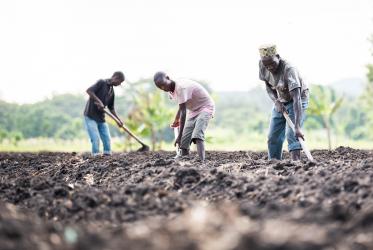South Sudan is in crisis again. People are suffering. There is no food. The situation is very urgent, according to the latest news from church leaders in South Sudan. The ceasefire called by the president and the first vice president is holding. The majority of the people remain indoors, fearing to venture outside even though guns have gone silent. Church compounds are sheltering thousands of civilians who fled from their homes. In the Catholic churches there were an estimated 16,000 people and more than 6,000 at the Protestant churches in Juba. No shops or banks are open. WCC News met with Dr Nigussu Legesse, programme executive for South Sudan in the World Council of Churches (WCC) on 14 July 2016.
By Marianne Ejdersten*
The country of South Sudan achieved independence from Sudan in July 2011 after more than 20 years of civil war. Over 2.5 million people died as a result of the conflict, and millions more fled the violence. Renewed fighting in South Sudan has raised serious concerns around safety and security for people in the new, increasingly fragile country. The ACT Alliance reported that the situation rapidly deteriorated last weekend with a reported death toll of nearly 300 people, and armed violence erupting in Juba and surrounding areas.
The churches have historically played a critical role in building peace in South Sudan: they continue to play an active role in advocating for peace, hosting neutral forums, and reconciliation work.
Q: What is happening in South Sudan now?
Dr Legesse: “I have learned today from three senior church leaders in Juba that Juba is relatively quiet; there is not much gunfire. The call for the ceasefire by both sides appears to be working, which is good news.“
He added, “However, there is still fear and people don’t feel safe. They lost confidence in going out of their shelters in the parishes around Juba. All the church leaders told me humanitarian support is to be considered as a top priority.”
Q: How many people are displaced?
Dr Legesse: “About 40,000 people have been displaced during this crisis and about 7,000 of them took refuge in different churches (parishes). In trying to return to their homes, most of them found out that their houses have already been looted and have nothing to fall back to or sustain them. These people need humanitarian support.”
Legesse underlined the urgent situation: “I was told this morning by one of the bishops in Juba that they were looking for porridges for children who are staying in one of his parishes and no porridges were available as required.”
Q: How is the general situation in South Sudan?
Dr Legesse: “The country already being on the brink of economic collapse. No wages have been paid to civil servants for months. There is closure of some South Sudanese embassies because of financial problems. People can’t bear this additional burden. Furthermore, the prices of food items, particularly maize flour — a staple food in South Sudan — has soared over the past days.”
He added: “A kilo of maize flour costs up to 50 South Sudanese pounds and it is on the rise because of shortage of supplies on the market. Food items for merchandise come into the country mainly from Uganda but I have learned that the road between Uganda and South Sudan (Juba) is not secure enough. A convoy is being used and this makes the situation even worse.”
Q: What are the churches doing to support in the region?
Dr Legesse: “The peace advisory group of All Africa Conference of Churches (AACC) that includes the WCC moderator, Dr Agnes Abuom, met on Tuesday at the AACC compound in Nairobi and discussed the situation on the ground. They released an appeal for all partners and friends of South Sudan to contribute any amount at their disposal for immediate support of the extremely vulnerable groups, women and children affected by the crisis.”
Q: What could we do to support?
Dr Legesse: “I have also learned that some members of the South Sudan Council of Churches Core Group and members of the ACT Alliance are meeting in Nairobi right now to compile available information that can help to strengthen the appeal launched by the AACC. Therefore, our helping hand is badly needed at this critical time in South Sudan. The only place where emergency food items can be bought at this stage is either Kenya or Uganda and those need to be transported by plane. Therefore, the contribution to the AACC appeal is extremely important to save lives.”
“The church leaders I spoke to emphasized the importance of church leaders meeting as soon as possible to set advocacy points and priorities. They believe advocacy for peace and reconciliation should continue. We need to accompany them with our prayers."
On 16 July, the WCC and the South Sudan Council of Churches, is inviting its member churches and all people of good will around the world to pray for South Sudan.
Legesse concluded: “I am grateful to all those who provided unreserved support to the people of South Sudan.”
*Marianne Ejdersten is director of communication at the World Council of Churches
Related links:
South Sudan on brink of major humanitarian crisis, church leaders report (WCC press release of 15 July 2016)
WCC member churches in South Sudan
All Africa Council of Churches
ACT Alliance South Sudan Forum
Interview with Radio Vaticana: Archbp of Juba issues wrenching appeal for help to save lives








